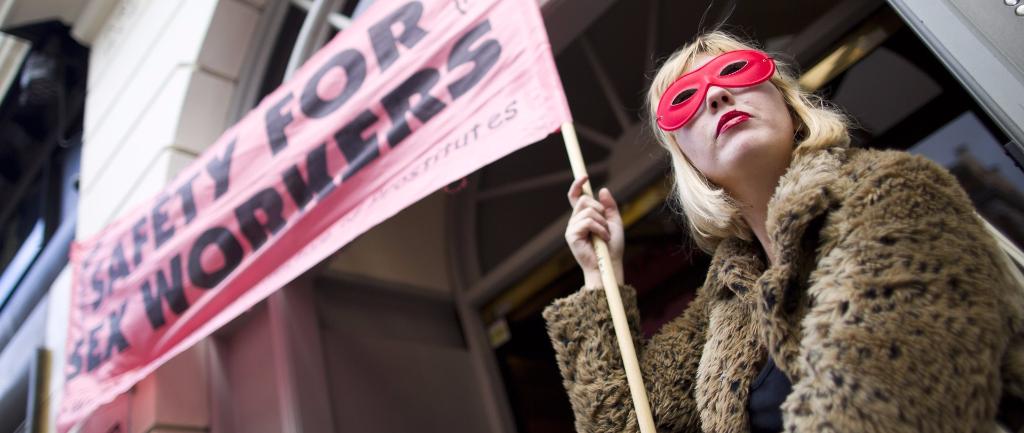And much of it is leveled at LGBT people and people living with or affected by HIV.
Last year, both in solidarity and in recognition of the impact on LGBT people and people affected by HIV, Lambda Legal formalized our position for decriminalizing sex work. Days later, we told the world what’s wrong with prosecutions that endanger sex workers’ safety.
With Amnesty International’s new material, we build an ever more dramatic showing of why we need to stop heaping criminal penalties on people engaged in sex trades.
First and foremost, we know that vectors of discrimination based on sexual orientation, gender identity, race and income often collide, resulting in more people in our communities turning to the sex trades to put food on the table and a roof over their heads. Prejudice that results in less access to education cuts choices of one’s livelihood, in which case sex work may be the option that rises to the top.
Add criminal laws to the mix, and you deepen the harm: “The stigmatized and criminalized nature of sex work routinely forces sex workers to operate at the margins of society in clandestine and dangerous environments with little recourse to safety or state protection.”
Furthermore, “Criminalization of sex work has specifically been shown to directly undermine global HIV prevention efforts. For example, police in many countries frequently confiscate and cite the use of condoms as evidence of sex work offences, creating a disincentive to their use and further jeopardizing the right to the highest attainable standard of health.” (These are some key reasons Lambda Legal has for years campaigned against the use of condoms as evidence of crimes designated as “prostitution-related.”)
The new Amnesty International reports from spots around the globe (Argentina, Hong Kong, Norway and Papua New Guinea) include damning patterns across diverse countries and cultures showing how criminalizing sex work fuels violence, perpetrated by everyone from clients to law enforcement: “Our research shows that criminalization of sex work gives police impunity to abuse sex workers and acts as a major barrier to police protection for sex workers.”
And the new reports show how criminalizing purchasers, sometimes called “the Nordic Solution,” doesn’t help. This “partial decriminalization” resulted in further stigmatizing workers as well as buyers. And criminalizing only buyers made sex workers less safe: “Many sex workers described buyers’ anxiety about police detection, and being asked to visit buyers’ homes to protect them from police detection. In the interviews conducted by Amnesty International this was associated with less control for sex workers and a greater risk of violence.” Sex workers in Norway had few options for help. One told Amnesty, “If a customer is bad you need to manage it yourself to the end. You only call the police if you think you are going to die. If you call the police you lose everything.”
As we work toward decriminalization, we have to make clear that sex work and human trafficking are very different things. We (and Amnesty) remain utterly opposed to forced or coerced labor of any kind. So it’s helpful to raise up the difference: “A key component of Amnesty International’s definition of sex work is the focus on consent as a factor to distinguish sex work from human trafficking, sexual exploitation, sexual violence and gender-based violence.”
Decriminalization can help trafficking victims, as Amnesty’s reports show: “When not threatened with criminalization, sex worker organizations have collaborated with police to identify women and children who have been trafficked, and refer them to the necessary services.” On the flip side, criminalizing sex work can add barriers to helping trafficked people: “Equally, there is some evidence that traffickers use the existence of criminal law and policy enforcement against sex work to control trafficked persons and discourage them from approaching police for help.”
And if we can lift these criminal laws, we can see the promise of better lives, based upon the experience of other countries: “New Zealand decriminalized sex work in 2003 to safeguard sex workers’ human rights… [F]ollowing decriminalization, sex workers said they were more able to refuse particular clients and to negotiate safer sex. Government research also confirmed that the relationship between sex workers and police was transformed. In a 2008 study, 70 per cent of sex workers were more likely to report violence and crimes to police, and police were more likely to be seen as protectors rather than enemies or perpetrators.”
Grapple with the facts, and the chorus of voices for decriminalizing sex work understandably grows. “Others supporting or calling for decriminalization include the World Health Organization; UNAIDS; Global Commission on HIV and the Law; the UN Special Rapporteur on the Right to Health; Human Rights Watch; The Open Society Foundations; and the Global Alliance Against Traffic in Women.”
We are in good company. Less violence. More justice. Decriminalize sex work.

Follow this web link play online free fireboy and watergirl and play the most exciting brain twister video game for free and online.You love to play and share this with your friends.Thank you so much for the entertaining Junction.